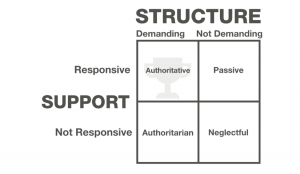“When correcting a child, the goal is to apply light, not heat.” –Woodrow Wilson
Do any of you remember feeling “heat” from your parents? That one childhood incident that initiated the full fury of mom and dad?
Everyone has a few stories. Woodrow Wilson himself had three daughters within three years, so I’m guessing even he had to parent with heat at least a few times.
But, I think he’s on to something with his quote.
It’s been said that when it comes to good parenting, it’s not about what we way, but how we say it. This is exceedingly true in any relationship, but especially as it relates to the spongy hearts of our children, who are soaking up every nuance of our parenting style while developing their own persona.
My Own Family
I grew up in a family of seven children, with almost 16 years between oldest and youngest. I remember the constant movement of ice skating, art, swimming and piano lessons, cross country meets, basketball games, track meets, recitals, oh, and just trying to finish each day with all seven kids still fed and functioning. (Baths were optional!)
As a child, I never once thought about the marathon-like endurance it takes to parent well, day after tedious day. I never considered the skill and patience it took to pull two shopping carts full of food and young children through the store because my family consumed a gallon of milk and a loaf of bread daily. I don’t ever remember caring much about the quality of my father’s work environment or the fact that he probably had bad days in the office.
But, now that I’m a dad, I understand it must have been hard being our parents. And, as I navigate technology with my own children, I wonder if parenting is even more difficult now in the digital age.
Your Parenting Style Matters
In the 1960s, psychologist Diana Baumrind identified two essential qualities for raising healthy children, “parental demandingness” and “parental responsiveness.” Using these two qualities, she and her team developed a grid for understanding parenting styles:
- Authoritarian parents demand a lot from their children, but they are not very warm. Some are abusive, but many are not–they are simply rigid and harsh.
- Permissive parents are very warm and responsive to their children, but they demand very few things. These parents might be called “pushovers,” allowing their child to follow every whim and impulse.
- Neglectful parents give their children neither structure or support. They simply aren’t present at all.
- Authoritative parents place high demands on their children, but they are also responsive and often explain the rationale for firm decisions. They don’t indulge their children, but love and affirm them with warmth and tenderness.

The prize lies with parents who land in the authoritative quadrant.
What does our parenting style have to do with training children to stand firm in a pornographic culture?
Everything.
If you’re a pastor, ministry leader, or teacher, check out Porn and Parenting Styles: What Pastors Need to Know.
Authoritarian Parents
Authoritarian parents (all structure, no support) train their kids to want something other than another dose of shame and pressure. These parents haven’t invested time into knowing the unique qualities of their children and ignore the need to be responsive to their kids’ individual needs in specific situations.
Kids in these homes start to believe their parents don’t care about them. So when outside pressures come, they bottle it up–thinking they need to “suck it up”–or they seek refuge and solace elsewhere. In the face of sexual temptation, kids with authoritarian parents may cling to the judgment-free, affirming, sometimes anonymous embrace of sex or pornography. In other words, legalistic parents unwittingly chase their children into the minefield of sexual sin.
Permissive Parents
Permissive parents (no structure, all support) are at the other extreme, allowing their children to believe that every emotion is fine. There are few rules, because any restrictions on a child’s behavior would cause tension and sadness, which is to be avoided at all costs. These parents have been labeled as “helicopters,” while they hover around every aspect of their child’s life, dropping in from time to time to smooth out disturbances. Recently, we’ve seen an even more extreme breed of permissive parents of the “lawnmower” variety. These parents don’t wait for disturbances like the helicopter parents. Instead they proactively scan the horizon for any signs of trouble and mow it down in order to provide a smooth, 100% friction-free life.
On the surface, these parents appear to be loving and nurturing, but their children end up buying into the cultural lie that the most important things in life are to feel good, happy, and appreciated. In other words, it feeds a “me first” mentality.
And, because sex brings an obvious element of pleasure, there’s nothing in the child’s upbringing that would compel him/her to say no. If life is about me, and me feeling good, then who wouldn’t have sex? Who wouldn’t masturbate daily? Who wouldn’t watch pornography regularly? Indulgent parents unwittingly train their children to foolishly wander into the minefield of sexual promiscuity.
Neglectful Parents
Children of neglectful parents (no structure, no support) are often blown like a leaf in the wind, following the winds of culture or environment.
Authoritative Parents
Our goal is to be authoritative (all structure, all support). But, be careful not to misunderstand the context.
This authority does not come simply because you are a parent. This is a balanced authority that understands it is both inherent and earned. An authority that “lords” itself over its subjects can embitter. But an authority that is exercised through a lens of attention, focus, discipline and devotion is empowering and draws its subjects into a deeper connection.
So, where is your parenting style? What is the overall atmosphere of your home? Take a simple yes/no self-assessment:
- Is your home a place where your kids feel affirmed, encouraged and loved?
- Are you having regular conversations about about making wise choices and the reasons for those choices?
- Are you (or someone else) a spiritual leader in your home?
- Do you coach your kids through problems and conflict, teaching them to solve issues?
- Do you ever stop to just listen to your kids?
- Have you ever put your electronics down for a full weekend?
- Have you ever let your kid gently fail at something, while under your watchful eye?
- Is the tone you use with your children more often caring than critical?
- Does your presence in the home typically invite a sense of calm and stability?
If you answered no to any of these, then it might be a good idea to reassess how you parent.
Admit When You’re Wrong
“It’s important to let our kids know we are aware of our inadequacies. Tell them. You have nothing to lose in honestly admitting to them that you didn’t do everything correct as a parent.” –Stephen Arterburn and Jim Burns, When Love is Not Enough
Wherever you find yourself on the parenting styles grid, or however many “no” responses you had for the self-assessment, please know you have a tremendous opportunity to lead the way in repentance and model true humility and honesty with your kids by admitting you might have screwed up in a few places. Your kids will take notice. Former pastor and leadership coach John Maxwell says, “You replicate what you are.”
For the authoritative parent, this conversation will demolish the oppressive spirit of perfectionism, letting your child know it’s okay to not be okay sometimes. For the permissive parent, a course correction will allow their child to grow through struggle, feeling a sense of deep satisfaction from “figuring it out themselves” when confronted with difficulties without mom’s intervention.
No one changes their parenting style overnight. For many, any parenting change will come up against generational tendencies that do not give up ground easily. The way we parent our children is as much a reflection of our own hearts as it is a response to the hearts (and behaviors) of our children. But, fight back with persistence because you can do this!









The ‘Parenting Chart’ was not loaded into the article. I’d like to see it.
Hi Patty!
So sorry about that! I have updated the post, and the chart should be visible now. Let me know if you still cannot see it!
Blessings,
Moriah